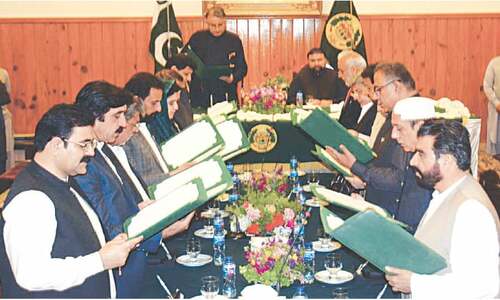
LONDON: Speaking at the second annual Lahore Literary Festival (LLF) in London, Malala Yousafzai, Pakistan’s only living Nobel laureate, repeated her call for girls in Pakistan and around the world to have greater access to education. “Many women never get the chance to be themselves. Education is the only way women can go forward in their lives,” she said.
Malala, now 20 and who has been in Oxford University for four weeks, said she is trying to focus on her studies of philosophy, politics and economics whilst continuing her work for girls’ education.
“People often say what have I done in Pakistan? That is one of the criticisms,” she said. “But we can’t mention exactly who we are working with because of security issues.”
She said she has started projects in the Swat Valley and is supporting local activists and champions of education in Pakistan and other countries.
Malala, who said she misses Pakistan, said her top priority is to help girls speak out for themselves. “I am not their voice. I encourage them to find their own voice.” The LLF event was also an occasion for Malala to launch her latest publication, a picture book, Malala’s Magic Pencil, which describes what happened to her after she started speaking out for girls’ education in Swat.
“I just found that so many girls around the world are interested in my story,” she said in front of a packed, enthusiastic audience that repeatedly applauded her calls for girls’ education.
Echoing Malala’s remarks, Maleeha Lodhi, Pakistan’s permanent representative to the UN, identified education as Pakistan’s biggest challenge. And she said even if there were security challenges, the key trends were pointing to enhanced democratic development.
The army, she said, was part of the national consensus in favour of democracy, the globally connected middle cases were becoming increasingly numerous and power was being diffused to institutions such as the media and the judiciary.
Earlier, LLF Director Razi Ahmed welcomed the participants to the event which was held in the British Library. He said media perspectives on Pakistan were sometimes harsh and often ignored the country’s cultural heritage.
The British Library houses a huge collection of South Asian material. As well as records from the East India Company, it has paintings, photographs and manuscripts including Persian ones from Sikh Lahore.
On the legacy of 1947, novelist Kamila Shamsie spoke about the changing attitudes of successive Pakistani generations to partition. “It is hard for Indians and Pakistanis to tell the story of achieving freedom and liberation... a story of unbelievable violence and suffering,” she said. She said it has been equally difficult to tell the story of 1971 at which time violence was inflicted on the majority in Pakistan by the minority. These events are not in Pakistan’s history books: “The world of fake news? We’ve been living in it all along,” she said.
Author Mirza Waheed argued it is impossible to move on, as some young people say they want to, from events that continue to have a major impact. “In 1998,” he said, “partition went nuclear.”
Writer Tahmima Anam said partition is a topic still not widely discussed in Bangladesh because it is seen as just one in a whole series of major events to affect the country.
In a session on food as an expression of identity and means of cultural exchange, the so-called ‘queen of curries’, Madhur Jaffrey, said that after thousands of years of eating the same food on the subcontinent, for many people such as Punjabis, shared recipes still exist: “The places were parted but they are still cooking the same dishes,” she said. “Only the names are different.”
But she added that there is a tendency for Pakistanis to eat more meat. “There is much more development in India on the vegetarian side.”
The internationally renowned Pakistani food writer Sumayya Usmani said that places that became Pakistan, such as Sindh, had their own cuisines and own flavours, but the country now has a developing cuisine. “Pakistani cuisine is a modern cuisine that has been in the making for centuries. It is constantly evolving,” she said.
In a session on pre-partition Lahore, Professor Ian Talbot of the University of Southampton and Professor Tahir Kamran of Government College, Lahore, discussed the cultural history of Punjab’s leading city during the Raj. Speaking of Lahore as having had a longstanding, plural cultural environment, Professor Talbot said the city had never been a backwater but was able, in the colonial period, to widen its links to the outside world even further. As a result more people arrived in the city. “Some were so attracted by the cultural life of the city that they stayed on and contributed to the commercial life as well,” said Professor Talbot.
Another aspect of the city’s importance was Lollywood, which almost rivalled Bombay and which made cultural life accessible to new groups. “Opportunities were thrown open for women to embrace acting,” said Professor Kamran who also stressed Lahore’s importance as an educational centre. But much of this activity was affected by the events of 1947.
“Partition was a crucial blow to the culture of Lahore,” Professor Kamran said.
Published in Dawn, October 29th, 2017












































Dear visitor, the comments section is undergoing an overhaul and will return soon.